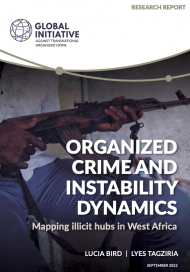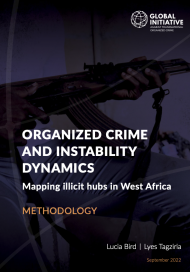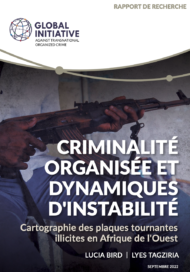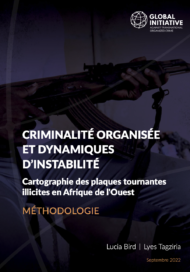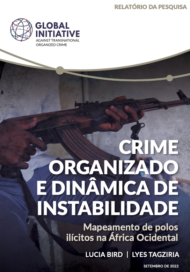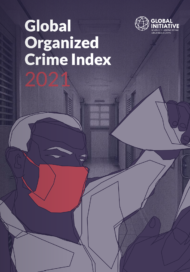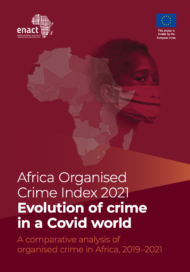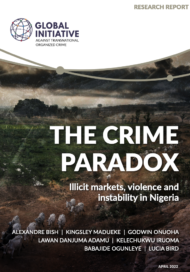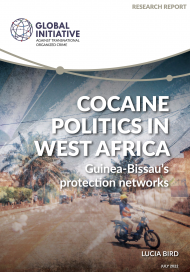Access the online mapping tool here
Are you a journalist? Access the Media kit here
The deteriorating security situation across parts of West Africa and the Sahel underscores the importance of better understanding the relationship between crime and conflict.
As the nature of armed conflict in West Africa is in flux – with the constellation of conflict actors multiplying, the intensity and geographic dispersion of violence growing, civilians increasingly targets of attacks, and conflicts more commonly spreading across borders – now is a key moment to consider the role played by illicit economies in creating the enabling environments for conflicts to develop, and in prolonging them.
While large-scale civil wars have reduced dramatically in frequency over the past two decades, the fall of Gaddafi in Libya and the uprising in northern Mali in 2012 triggered a wave of instability that continues to deteriorate to this day. Among the principal security threats affecting the Sahel region is violent extremism and jihadist groups. From 2020 to 2021, violence linked to militant Islamist groups in the Sahel almost doubled. Fatalities from such attacks are on the rise and millions have been displaced, in particular in Burkina Faso, which has become the epicentre of violence.
However, while many of the armed actors operating in the Sahel subscribe to extremist interpretations of Islamic jihad, the driving force behind the continued proliferation of violent extremist groups in the region is a combination of various deep-rooted structural issues. These include corruption, poor governance, impunity among state security forces and socio-economic marginalization of communities across swathes of the region.
But there is another important driver of conflict and instability, not just in the Sahel, but in other countries such as Nigeria, Cameroon and Senegal, among others. Illicit economies are major sources of funding for countless armed actors across West Africa, and many illicit markets contribute to swelling violence, not least the trafficking of arms. Banditry in Nigeria, for example, is a significant security threat, with bandits frequently raiding, ransacking, attacking and kidnapping in villages across many of the country’s northern states.
The other side of the coin is that instability and state fragility more broadly is an important enabler of illicit economies, with criminal actors exploiting weak rule of law. The economic damage inflicted on communities by conflict can in many cases leave populations dependent on informal, and in some cases illicit, livelihoods. But the relationship between illicit trade and instability is not straightforward. In some circumstances, informal and illicit economies can sustain a degree of stability by providing communities with a livelihood. As the security situation deteriorates, and the geographies of conflict and illicit economies increasingly overlap, it is crucial to understand how these two dynamics interact.
Yet the intersection between illicit economies and instability is an often misunderstood and over-simplified subject of research and debate. The inherently clandestine nature of organized crime poses an obstacle to accurately understanding the dynamics of illicit economies and their relationship with conflict and instability. In West Africa, this is compounded by the paucity of comparable data in much of the region.
This report represents a step towards addressing this deficit. It presents the findings of a new initiative that maps the key geographic hubs of illicit economies across West Africa (Benin, Burkina Faso, Cabo Verde, Cameroon, Central African Republic, Chad, Côte d’Ivoire, Gambia, Ghana, Guinea, Guinea-Bissau, Liberia, Mali, Niger, Nigeria, Senegal, Sierra Leone and Togo).
The Illicit Economies and Instability Monitor, presented in this report, assesses how the illicit economies identified at each hub impact on instability. The study therefore creates a public, consolidated repository of evidence surrounding illicit economies, which could in the future be built on and analyzed over time to reveal longitudinal trends.
Contact claudio.landi@globalinitiative.net and nicole.helou@globalinitiative.net to request the Media Kit
Subscribe to the WEA-Obs dedicated mailing list
Cliquez ici pour accéder au Dispositif de surveillance des économies illicites et de l’instabilité – IEIM > https://wea.globalinitiative.net/illicit-hub-mapping/
La détérioration de la situation sécuritaire dans certaines parties de l’Afrique de l’Ouest et du Sahel souligne l’importance d’une meilleure compréhension de la relation entre la criminalité et les conflits.
Alors que la nature des conflits armés en Afrique de l’Ouest est en pleine mutation – la constellation des acteurs du conflit se multipliant, l’intensité et la dispersion géographique de la violence augmentant, les civils étant de plus en plus souvent la cible d’attaques et les conflits s’étendant plus souvent au-delà des frontières – le moment est venu d’examiner le rôle joué par les économies illicites dans la création d’environnements propices au développement des conflits et à leur prolongation.
Si la fréquence des guerres civiles à grande échelle a considérablement diminué au cours des deux dernières décennies, la chute de Kadhafi en Libye et le soulèvement dans le nord du Mali en 2012 ont déclenché une vague d’instabilité qui continue de se détériorer à ce jour. Parmi les principales menaces sécuritaires qui affectent la région du Sahel figurent l’extrémisme violent et les groupes djihadistes. De 2020 à 2021, les violences liées aux groupes islamistes militants au Sahel ont presque doublé. Les décès dus à ces attaques sont en hausse et des millions de personnes ont été déplacées, en particulier au Burkina Faso, qui est devenu l’épicentre de la violence.
Cependant, alors que de nombreux acteurs armés opérant au Sahel adhèrent à des interprétations extrémistes du jihad islamique, la force motrice derrière la prolifération continue des groupes extrémistes violents dans la région est une combinaison de divers problèmes structurels profondément enracinés. Il s’agit notamment de la corruption, de la mauvaise gouvernance, de l’impunité des forces de sécurité de l’État et de la marginalisation socio-économique des communautés dans de vastes zones de la région.
Mais il existe un autre moteur important de conflit et d’instabilité, non seulement au Sahel, mais aussi dans d’autres pays comme le Nigeria, le Cameroun et le Sénégal, entre autres. Les économies illicites sont des sources majeures de financement pour d’innombrables acteurs armés à travers l’Afrique de l’Ouest, et de nombreux marchés illicites contribuent à gonfler la violence, notamment le trafic d’armes. Au Nigeria, par exemple, le banditisme constitue une menace importante pour la sécurité, les bandits se livrant fréquemment à des raids, des pillages, des attaques et des enlèvements dans les villages de nombreux États du nord du pays.
Le revers de la médaille, c’est que l’instabilité et la fragilité de l’État, de manière plus générale, sont des facteurs importants pour les économies illicites, les acteurs criminels exploitant la faiblesse de l’État de droit. Les dommages économiques infligés aux communautés par les conflits peuvent, dans de nombreux cas, rendre les populations dépendantes de moyens de subsistance informels et, dans certains cas, illicites. Mais la relation entre le commerce illicite et l’instabilité n’est pas simple. Dans certaines circonstances, les économies informelles et illicites peuvent maintenir un certain degré de stabilité en fournissant aux communautés des moyens de subsistance. À mesure que la situation sécuritaire se détériore et que les géographies des conflits et des économies illicites se chevauchent de plus en plus, il est essentiel de comprendre comment ces deux dynamiques interagissent.
Pourtant, l’intersection entre les économies illicites et l’instabilité est un sujet de recherche et de débat souvent mal compris et souvent trop simplifié. La nature intrinsèquement clandestine du crime organisé constitue un obstacle à la compréhension précise de la dynamique des économies illicites et de leur relation avec les conflits et l’instabilité. En Afrique de l’Ouest, ce problème est exacerbé par la pénurie des données comparables dans une grande partie de la région.
Ce rapport représente un pas en avant pour combler ce déficit. Il présente les résultats d’une nouvelle initiative qui cartographie les principaux centres géographiques des économies illicites en Afrique de l’Ouest (Bénin, Burkina Faso, Cabo Verde, Cameroun, République centrafricaine, Tchad, Côte d’Ivoire, Gambie, Ghana, Guinée, Guinée-Bissau, Liberia, Mali, Niger, Nigeria, Sénégal, Sierra Leone et Togo).
L’Observatoire des économies illicites et de l’instabilité, présenté dans ce rapport, évalue l’impact des économies illicites identifiées dans chaque hub sur l’instabilité. L’étude crée donc un répertoire public et consolidé de preuves relatives aux économies illicites, qui pourrait à l’avenir être développé et analysé dans le temps pour révéler des tendances longitudinales.
Contactez claudio.landi@globalinitiative.net et nicole.helou@globalinitiative.net pour demander le kit média.
S’inscrire à la liste de diffusion dédiée à WEA-Obs
